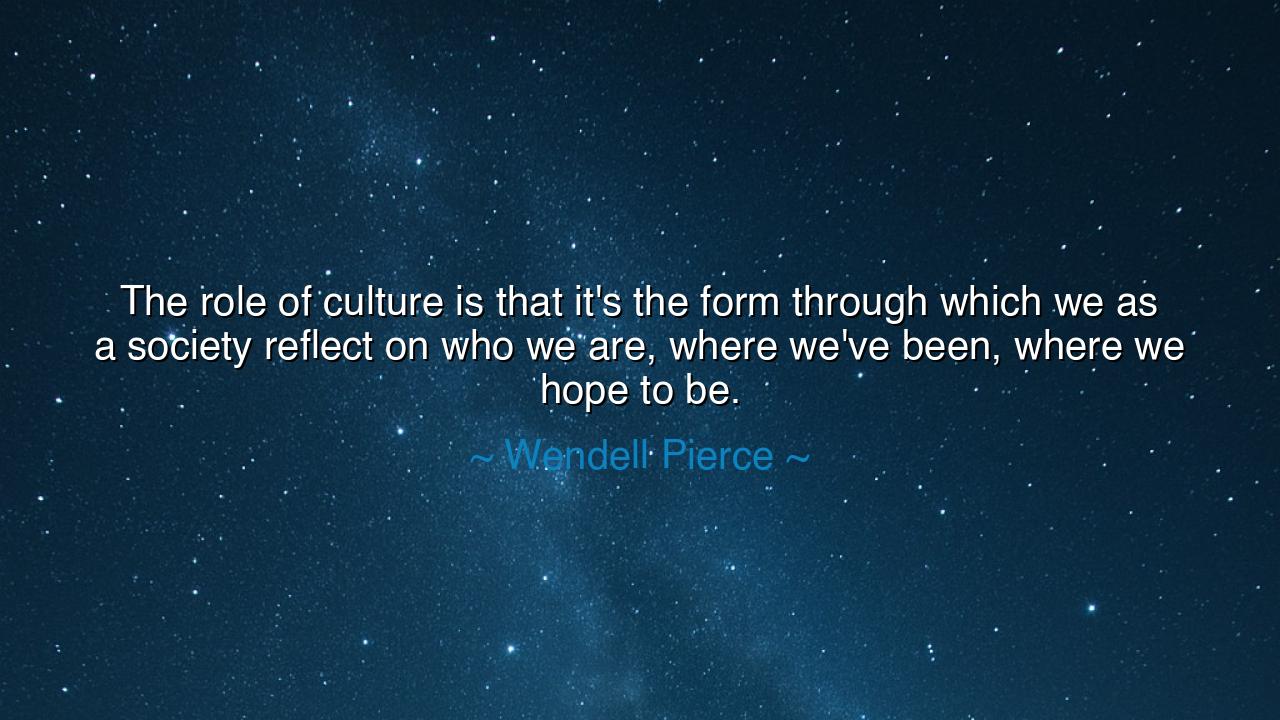
The role of culture is that it's the form through which we as a
The role of culture is that it's the form through which we as a society reflect on who we are, where we've been, where we hope to be.






Wendell Pierce, with the voice of one who has walked the stage and screen as both artist and witness, once proclaimed: “The role of culture is that it’s the form through which we as a society reflect on who we are, where we’ve been, where we hope to be.” These words shine with timeless truth, for they remind us that culture is not decoration, not mere leisure, but the vessel of memory, the mirror of identity, and the torch that lights the path into the unknown. Without culture, a people drifts; with it, they know themselves.
The meaning of his words rests in three great pillars. First, culture reflects “who we are”—it captures our values, our language, our rituals, our art, and even our humor. Second, it tells us “where we’ve been”—preserving stories of struggle, triumph, failure, and transformation. And third, it shows “where we hope to be”—expressing dreams, ideals, and the aspirations of generations yet unborn. In this way, culture is both anchor and sail: holding us to our roots while propelling us forward.
History proves this again and again. Consider the role of African American spirituals and blues during centuries of oppression in the United States. These songs were more than music—they were culture embodying sorrow, endurance, and the unbreakable hope of a people. Through them, generations reflected on “who they were” in bondage, “where they had been” in suffering, and “where they hoped to be” in freedom. Later, those same cultural seeds blossomed into jazz, gospel, and civil rights anthems that reshaped the nation’s very soul. This is Pierce’s truth made flesh: culture carries the story of survival and the vision of liberation.
Or look to the Renaissance, when Europe emerged from centuries of darkness. It was not armies that led this rebirth, but culture—the art of Michelangelo, the words of Dante, the discoveries of Da Vinci. Through painting, poetry, and invention, people remembered “where they had been”—in ignorance and war—but also dreamed of “where they hoped to be”—a world of knowledge, beauty, and human dignity. The Renaissance was not just history—it was culture reflecting and reshaping the destiny of society.
Yet Pierce’s words also carry a warning. When culture is silenced, controlled, or ignored, a society loses the ability to reflect. Think of totalitarian regimes that burned books, censored artists, and silenced musicians. Their aim was clear: to erase memory, to sever a people from their past, and to blind them to the future. Without culture, citizens cannot reflect, and without reflection, they cannot resist. Thus, culture is not a luxury—it is a shield against tyranny, a safeguard of freedom.
The lesson for us is both noble and practical: honor culture. Do not dismiss it as trivial or secondary. It is through song, story, art, film, and ritual that we remember ourselves. Support the artists, storytellers, teachers, and guardians of memory, for they carry the weight of our reflection. And in your own life, contribute to culture—write, sing, create, or simply preserve the traditions of your family, your community, your people. In doing so, you join the eternal dialogue of humanity.
Practical action lies close at hand. Visit museums, not as tourists but as seekers of wisdom. Read books that carry the voices of the past. Listen to the stories of elders and pass them on. Support local art, music, and theater, for these are not luxuries but mirrors of society. And above all, reflect: ask yourself who you are, where you have been, and where you hope to be—and let culture be the guide that shapes your answers.
Thus, let Wendell Pierce’s words endure: “The role of culture is… the form through which society reflects on who we are, where we’ve been, where we hope to be.” Carry them in your heart, for they remind us that the truest wealth of a people is not gold or empire, but the living flame of culture. And as long as that flame burns, the story of a people will never be lost, and their future will never be without hope.






AAdministratorAdministrator
Welcome, honored guests. Please leave a comment, we will respond soon